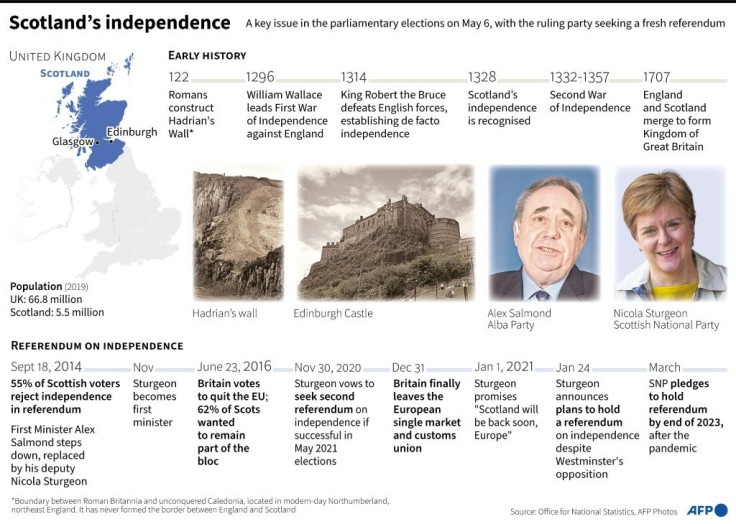Just Short Of Majority, Scottish Independence Party Demands Referendum
The Scottish National Party on Saturday won a fourth term in power in the devolved parliament just short of an outright majority, with its leader Nicola Sturgeon reiterating her demand for a fresh referendum on independence.
The SNP won 64 seats in the 129-seat parliament in Thursday's vote, just shy of the 65 it was seeking for an overall majority to lend strength to its push for a referendum, a demand British Prime Minister Boris Johnson has condemned as "reckless."
The Scottish Conservatives retained their second party status with 31 seats while Scottish Labour won 22 seats, followed by the Scottish Greens with 8 seats and the Liberal Democrats with 4. The result saw little change from the last vote in 2016.

The UK vote in local and regional elections on "Super Thursday" were the first major polls since Brexit and the pandemic. The count was much slower than usual due to virus safety measures.
Johnson's Conservative Party performed strongly in England, outdoing Labour in its traditional heartlands although the main UK opposition party held onto power in the devolved parliament in Wales.
But the focus was on Scotland, where the vote for the devolved parliament in Edinburgh saw the ruling SNP seek the nation's backing for its planned "indyref2", which could reshape the UK.
Sturgeon brushed off the lack of an outright majority, saying that along with the Scottish Greens, Holyrood had an increased pro-independence majority.

"There is simply no democratic justification whatsoever for Boris Johnson or indeed for anyone else seeking to block the right of the people of Scotland to choose our own future," she said.
Johnson wrote to Sturgeon congratulating her on her election result, Downing Street said.
"I believe passionately that the interests of people across the UK and in particular the people of Scotland are best served when we work together," Johnson wrote to Sturgeon, asking her to take part in a meeting to discuss recovery after the pandemic.

Scots voted twice, once for a constituency MSP and once for a party, with those votes allocated regionally in a proportional representation system designed to prevent a single party dominating.
The SNP has not won an overall majority at Holyrood since 2011.

Johnson, in an interview with The Daily Telegraph published earlier Saturday, insisted he would not agree to a referendum even if the SNP won a majority.
"I think a referendum in the current context is irresponsible and reckless," he said.
Sturgeon said in her victory speech that if Westminster refused permission, this would place it "in direct opposition to the will of the Scottish people".

She has set out plans to hold a legal referendum after the virus crisis passes and by the end of 2023.
Former First Minister Alex Salmond fielded a new pro-independence party called Alba, which he said would press the SNP for a speedier referendum.
But in a humiliating reversal for the once-powerful politician, Salmond and his party failed to win any seats.
Salmond stood down as first minister after the first independence referendum in 2014 saw 55 percent vote "no".
Recent polls suggest "no" would win again in an immediate referendum, as many fear further upheaval post-Brexit.
The SNP pledges that an independent Scotland would seek to rejoin the European Union after most Scots opposed Brexit.
In England, the Conservatives registered significant gains in council elections and mayoral races in England, while Labour's losses raised speculation over the future of its leader of just over a year, Keir Starmer.
The party responded by sacking its chair, Angela Rayner, but some MPs publicly criticised Starmer.
Johnson said the vote was "very encouraging" for his government, while Starmer said he was "bitterly disappointed".
Labour nevertheless equalled its best ever result in the Welsh devolved parliament Senedd Cymru after First Minister Mark Drakeford took a cautious approach to the pandemic.
In London, Labour politician Sadiq Khan won a second term as mayor, beating Conservative Shaun Bailey. He became the first Muslim mayor of a western capital in 2016.
The party also scored victories in several other key mayoral races including Greater Manchester and Liverpool city, where Joanne Anderson became the UK's first directly elected black woman mayor.
But the Tories' overall strong showing continued the trend from the last general election in December 2019, when Brexit was the dominant issue and Conservatives took seats across Labour's so-called "Red Wall" heartlands in northern England.
This time, Johnson has benefited from Britain's successful vaccine rollout -- despite the country also suffering one of the world's worst Covid-19 death tolls.
Dogged by scandals in recent weeks, Johnson also campaigned on his record of finally having "got Brexit done".
He touted government economic support during the pandemic and the vaccine drive.






